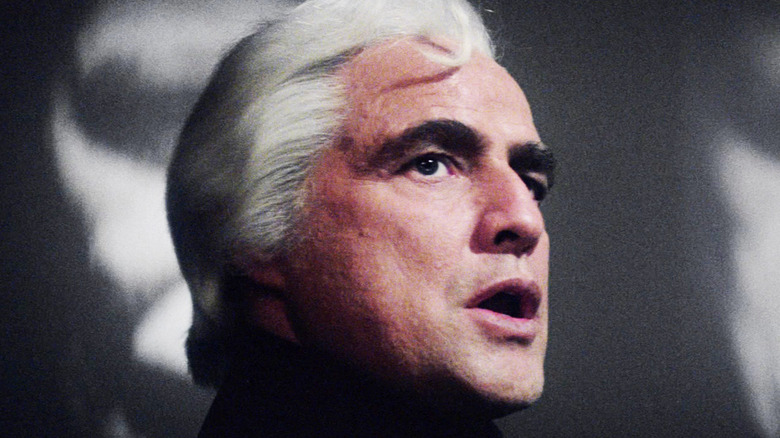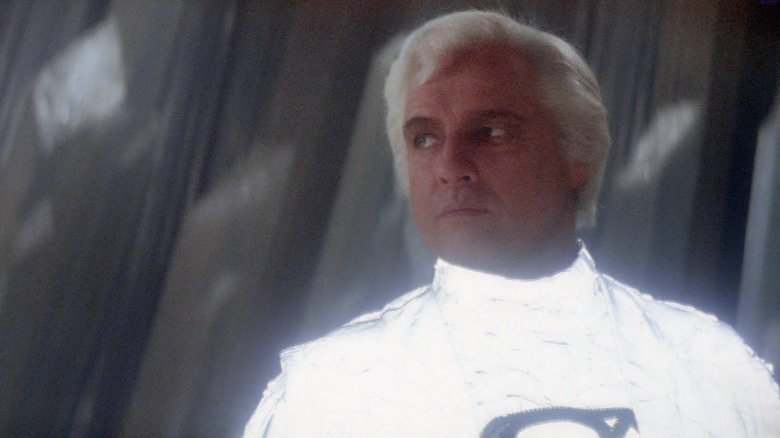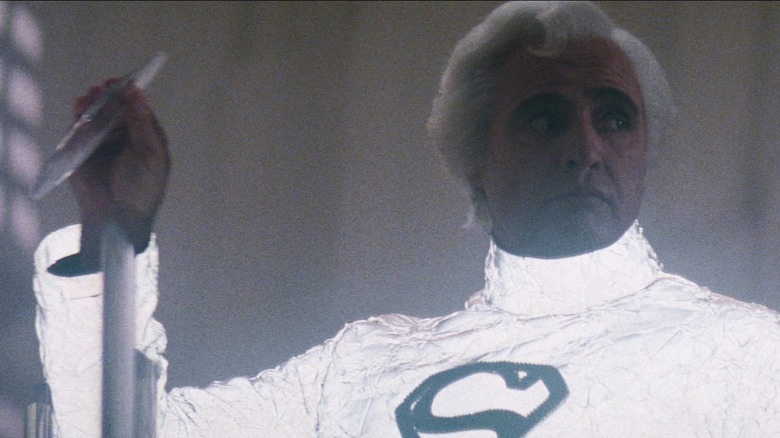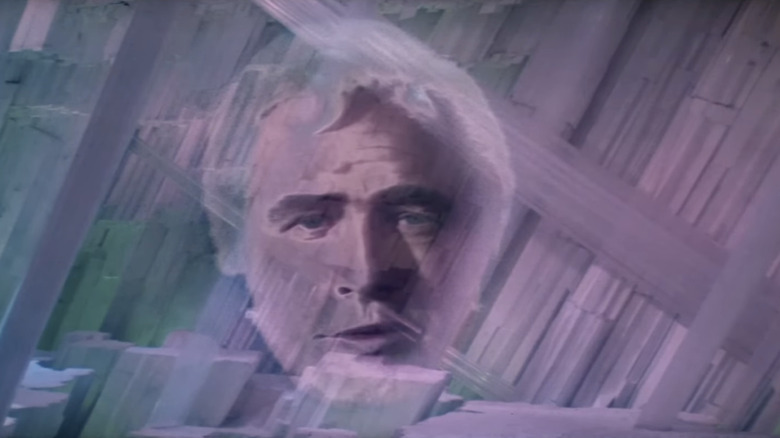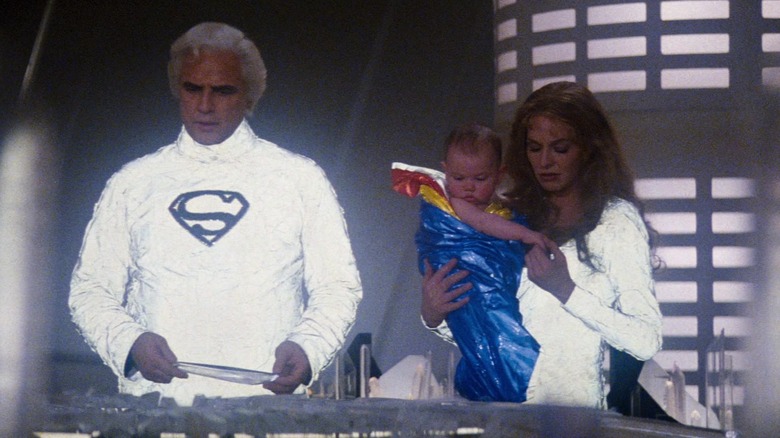Marlon Brando's Behavior On Christopher Reeve's Superman Set Made Filming A Headache
Marlon Brando played Superman's father, Jor-Elm in 1978's "Superman," but he made the entire shooting process a struggle. Not only did he require luring out of his trailer with the promise of food, the actor refused to learn lines and was generally uninvested in making a movie for which he received a small fortune.
Richard Donner delivered a blueprint for the modern blockbuster with "Superman." Aside from treating the source material with real reverence, the director made genuine technical innovations in his pursuit of fulfilling the movie's tagline: "You'll believe a man can fly." Of course, he and his movie were helped greatly by Christopher Reeve, whose Superman/Clark Kent remains the gold standard today, even in the wake of James Gunn's charming 2025 crowd-pleaser "Superman." But Reeve was a relative newcomer at the time, and an already seasoned Donner knew he needed some star power to bolster what was at the time, a real novelty of a movie.
So, he cast Marlon Brando in the role of Jor-El. The director must have known, however, that Brando had a reputation for being difficult to work with, even back in the 1950s when he was still making a name for himself. He left Rod Steiger high and dry for the most famous scene in 1954's "On the Waterfront" and caused no end of controversy behind the scenes of "Apocalypse Now." By the time he starred alongside Val Kilmer in 1996's "The Island of Dr. Moreau" he seemed to have given up altogether, frustrating his co-star to the extent he had an "awful" experience on the movie. The truth was that Brando — who passed away in 2004 — had given up long before that, which made shooting his "Superman" scenes nothing short of a nightmare.
There were signs of trouble before Marlon Brando was even cast in Superman
In 2016, Richard Donner spoke to The Hollywood Reporter about "Superman," recalling how he travelled to Los Angeles to meet Marlon Brando at his house on Mulholland Drive. At the time, the actor shared a compound with Jack Nicholson, and met the director and his producer, Ilya Salkind, at the gate before inviting them up for a drink. It was here that Brando made a perplexing suggestion and essentially tried talking his way out of appearing on-screen in "Superman." "Why don't I play this like a bagel?" he asked Donner, who went on to describe the rest of this bizarre exchange. "He said, 'How do we know what the people on Krypton looked like?'" recalled the director. "He had good logic. He said, 'Maybe they looked like bagels up there in those days?'"
"Superman" producer Ilya Salkind described the same moment in an interview with the Superman Homepage, where recalled Brando keeping him and Donner waiting for an hour before finally greeting them with his unlikely proposition. According to the producer, Brando also thought Jor-El should be depicted as "a suitcase" or a "green bagel that spoke with Brando's voice," all of which spooked Salkind. "I said 'My God, this is finished, the movie will not happen,'" remembered the producer. "The man will destroy everything. This is impossible. Jor-El will be a bagel."
Thankfully, Donner managed to talk Brando out of his fanciful take on the character by suggesting that kids would forever think of Marlon Brando when they thought of. The actor certainly was remembered for his portrayal of the Kryptonian, partly because he did end up giving a great performance, but also partly because of the controversy he stirred up.
On Superman, Marlon Brando had to be coaxed out of his trailer with food
Though he's on-screen for less than 20 minutes of the movie, Marlon Brando was paid $3.7 million for "Superman" and given 11.75% of the backend — a feat his buddy Jack Nicholson topped a decade later when he secured an even more unbelievable back-end deal and ensured "Batman" likely never made a profit. What's more, Brando had it written into his contract that he would only shoot for 12 days. As such, you might have expected him to put in at least some effort, but it seems he was almost entirely uninterested in the movie, to the extent that it took some major effort to even get him out of his trailer.
Actor Cary Elwes of "The Princess Bride" fame, worked on "Superman" as a 16-year-old runner and spoke to The Telegraph about his experience. According to Elwes, when an assistant director became sick, he stepped up to help where he could and was asked to essentially babysit Brando. "My job was to get Marlon out of his trailer," Elwes explained. "Marlon had no incentive to be on time, because his agent had struck the most amazing deal for him. Every day that the picture went over, he got another million dollars." As Elwes remembered it, Brando "drove poor [Richard] Donner up the wall" by keeping his own schedule and often waiting until after lunch to show up on-set.
Asked how he managed to tempt the veteran star from his trailer, Elwes said, "How did I manage it? Mainly with food. Once you fed Marlon, he was in a much better mood. So I tried to find delicacies that appealed to him, which were limited at Shepperton [Studios] at the time. He mainly wanted desserts."
Marlon Brando didn't learn his lines for Superman and upset Christopher Reeve
In his 2016 The Hollywood Reporter interview, Richard Donner recalled speaking to Marlon Brando's agent Jay Kanter prior to his meeting with the actor. Kanter told Donner that Brando "hates to work and he loves money," which certainly seemed to characterize his client's conduct on "Superman." According to Donner, the crew "had to put his dialogue on other actors' chests." The director continued, "He would say, 'I don't want to read it like I've read it before a bunch of times. The first time I read it, it'll be honest.'"
The actor also addressed the cue cards in a making-of featurette in which he said, "If you don't know what the words are but you have a general idea of what they are, then you look at the cue card it gives you the feeling, of the viewer hopefully, that the person is really searching for what he's going to say, because he doesn't know what he's going to say." In fairness, he might have been at least partly right, as nobody could say Brando's performance didn't work.
Still, his behavior clearly frustrated Christopher Reeve, who had some harsh words for the screen legend. During a 1982 appearance on "Late Night with David Letterman," the "Superman" star was remarkably candid about his experience with Brando, saying, "The man didn't care. I'm sorry. He just took the [money] and ran." Clearly, Reeve was expecting more from someone who was, to him, a genuine hero. But reverence for Brando didn't trump his own desire to do well in what was to be his breakout role. "I just still care," he added. "I'm a real beginner and I just care so much that it hurts when someone's phoning it in."
Marlon Brando sued Warner Bros. over his share of Superman's box office profits
Even after shooting on "Superman" had wrapped, Marlon Brando continued to cause trouble for the studio and producers. The actor sued Alexander Salkind, who had initially purchased the rights to a Superman movie and helped usher the project to fruition (though Richard Donner would first have to salvage a disastrous first script), Warner Bros., distributors, and several corporations, in a $50 million lawsuit which accused the defendants of violating the terms of his contract by shorting him on the box office profits.
Filed in December 1978, several days before "Superman" opened in theaters, the suit asked that Warners be prohibited from showing "Superman" or using "the name, acts, poses, appearances, performances, image, likeness, voice and/or other personal attributes" of Brando. According to the actor and his lawyers, the defendants had "undertaken to deprive [Brando's company] Penny Poke of its proper share of gross receipts from U.S., Canadian, and other foreign distributions," and requested the proper accounting be carried out.
Brando's request that further showings of "Superman" be halted was, perhaps unsurprisingly, thrown out. But the actor did receive a $15 million settlement as a result of the suit. As you might expect given all this trouble, plans to include footage of Brando in Richard Lester's "Superman II" were quickly scrapped — though they were eventually added back in for 2006's "Superman II: The Richard Donner Cut." Despite all the trouble that came with Brando's inclusion in the film, it did fulfil its purpose of lending the feature some extra gravitas and hey, if nothing else, at least Brando saved a "Superman" writer from getting stabbed with a steak knife.
